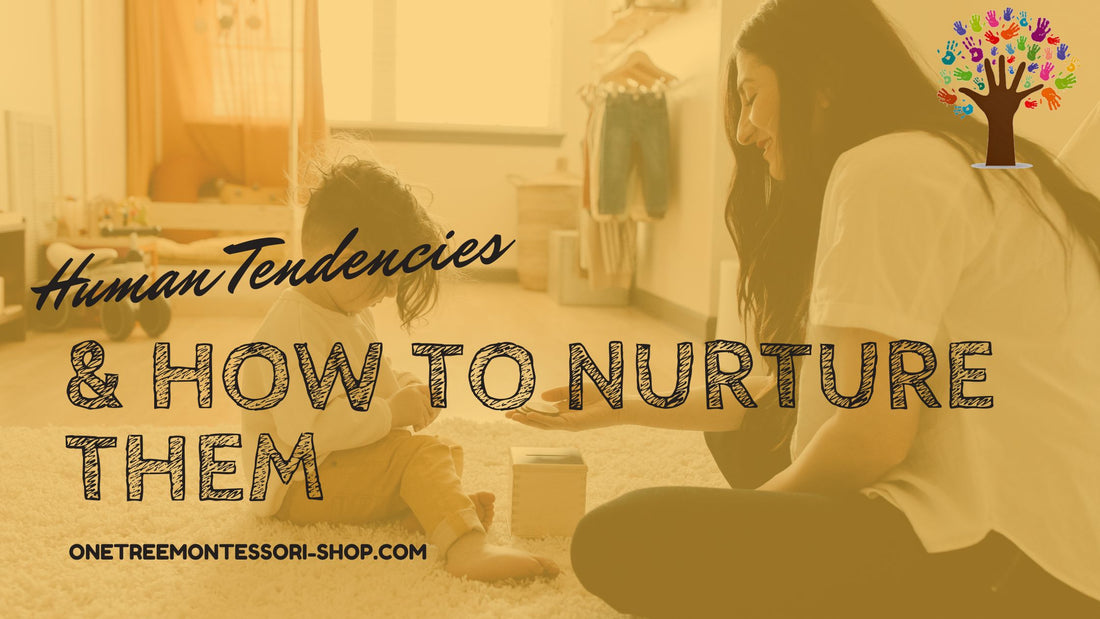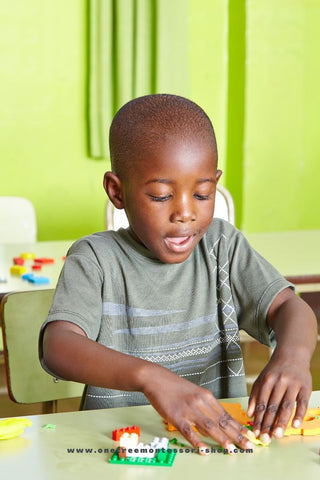
Human Tendencies & How to Nurture Them
Share
What connects us as humans? We are all so different and yet, undoubtedly, fundamentally the same. What would you write down, if you had to make a list of the qualities that all humans possess?
What are the Human Tendencies?

The human tendencies are intrinsic urges that drive people to interact with their surroundings.
Depending on how those surroundings respond, tendencies may be fulfilled, neglected or even distorted.
Sometimes called "potentialities", they are what makes us human, what partially determines our personality. You can picture it as a nursery full of seeds - depending on the weather and climate, some seeds grow and flourish, some sprout and survive, some never even germinate.
An endless variety of gardens with the same basic seeds; an endless variety of personalities with the same underlying traits.
However, the way Dr Montessori described these tendencies was quite different from the traits described by, for example, the Myers-Briggs Index. They are not descriptive, not for you to label your personality as such-and-such. Rather, they are foundational, in that they explain people's behaviour (especially children's) and so help us to create an environment where the tendencies can flourish, where a person (especially children) can unlock their full potential.
Dr Montessori's human tendencies work closely with the absorbent mind and sensitive periods, which are special phases during brain development. When the tendencies are nurtured, children become normalised - joyful, self-disciplined and independent.
Disclaimer: This article is currently quite centred on neurotypical development. I try update it as I learn more, but I am no specialist. If you have lived experiences as a neurodivergent or knowledge to share, please email me at info@onetreemontessori.com!
A List of the Most Important Human Tendencies
You will see further down that there isn't one universal list of tendencies, but more a range of observed ones. The following ones show up on every list and are very influential in shaping our interactions with the environment.
Exploration

How does it manifest?
The tendency to explore can be found in even the youngest of children: their head turns to listen, to look. They grab, mouth, wander off, they start asking questions, take things apart, look behind and under and in between.
What happens when it is nurtured?
When you let a child explore, watching over them but never offering help unless it is clearly needed, they become self-confident. They learn their limits and those of their surroundings. They experience consequences first-hand, they have opportunities to feel, to see, to touch and assimilate all of those impressions.
They develop a healthy curiosity, an appreciation of the world and its wonders, and a solid trust in their primary caregivers.
What happens when it is hindered?
Forbidding exploration, not answering questions, hovering over children, all stifle their urge to discover. They may become timid, scared of new things, reliant on the help of others and hesitant to try stuff. Or, they may lash out, rebel, ignore healthy boundaries and always look for something better.
Communication

How does it manifest?
Fairly self-explanatory, the urge to communicate is very evidently wired into our brains. From speaking, to muttering, to body language and signs and gestures, the tone of our voice, the speed of our movements - we want to share our experiences and be heard.
What happens when it is nurtured?
Open communication that is respectful and honest helps children become skilled at sharing their feelings, acknowledging the experiences of other people and express themselves with purpose - no matter in what form. They use misalignments of wishes and needs as a way to grow, finding ways for everyone to win.
What happens when it is hindered?
Children may grow up to be sullen, always ready to assume the worst. They may readily believe the stories their brain makes up to explain that which is not talked about. Alternatively, they may lash out, communicate with the intent of winning (as in, destroying the other person) or not take anyone else's view into account. Shutting down questions, not sharing your own feelings, not listening, prohibiting certain topics and neglecting to discuss concerns will hinder the tendency to communicate.
Work

How does it manifest?
A quick side note: This kind of "work" is not the kind you get paid for. It's an internal drive to produce, create, put in effort and effect change. "Play is the work of the child," said Dr Maria Montessori.
In children, it's the tendency to repeat things over and over, to build, destroy, take the longest route, make the biggest effort.
What happens when it is nurtured?
When we allow children to work/play without interruption, they become fulfilled, they start to concentrate and they learn to be proud of their effort.
What happens when it is hindered?
Children who have never had to exert effort become lazy, reliant on others. They may not see the value in contributing to society in their unique way, instead always taking the easy way out. If children are forced to do more than they can, if they are rewarded or punished, they learn to equate their self-worth with their productiveness. They fail to put in effort unless there is an ever-increasing materialistic prize to gain.
Calculation

How does it manifest?
Calculation is the tendency to, well, calculate - to plan, scheme, judge, evaluate, analyse. It's the baby concentrating to put its foot in its mouth. It's the child judging how far they can climb, jump or run. It's the idea, the plan we have of our day, of our lives, of our choices.
What happens when it is nurtured?
Children who could develop their tendency to calculate can plan well enough for their ideas and situations. They can gather information to make decisions, judge the likelihood of success, plan ahead and analyse the past to do better. They also happen to like Maths.
What happens when it is hindered?
Without the chance to plan, to record, to make choices, children become reliant on others, afraid of decisions and reluctant to face the future.
Self-Development

How does it manifest?
For children, this is the sum of all their urges to grow, develop, learn and master their environment. They want to help, ask for "big work", want to practise.
What happens when it is nurtured?
Children learn to accept mistakes as part of learning, become self-aware and foster a habit of seeing every challenge as a further step to mastery.
What happens when it is hindered?
Children believe they're stuck in a certain box (maybe lazy, not good at Maths, ditsy, scared). They stop growing and fear challenges.
A Background of Dr. Montessori’s Study of Tendencies
Maria Montessori herself did not clearly define the human potentialities. She often spoke of instincts in the child although she also saw instincts as something purely animalistic. She also used the words "needs to" and "tends to" or "is driven to" interchangeably for a variety of concepts.
Her son Mario Montessori and his son in turn, as well as other scientists after them, perused her writings and made their own observations, clarifying the term "human tendencies" or"potentialities". They distinguished various needs and tendencies - the difference will be discussed further on.
Mario Montessori junior, in his book "Education for Human Development" distinguishes these tendencies from animal instincts: they are less structured, guiding the way the child interacts with the world instead of driving behaviour in an absolutist way.
As the concept of human potentialities is still under observation and study, it is worth noting some current, slightly differing views on which tendencies we humans actually display:
Different Human Tendencies
- Order
- Work
- Language
- Calculation & abstraction
- Religion
- Moral orientation
- Social interaction
- Adaptation to culture
- Developing the own spiritual potential
- Choosing activities for self-development
- Abstraction
- Calculation
- Creativity
- Communication & Language
- Concentration
- Curiosity
- Exploration
- Gregariousness
- Order
- Repetition
- Perfection
- Work
- Self-Control
- Independence
- Orientation
- Order
- Exploration
- Communication
- Work
- Activity
- Exactness
- Repetition
- Manipulation
- Abstraction
- Creativity
- Self-Perfection
A New List of Montessori Human Tendencies

- Order is the tendency to find patterns, to classify and categorise, to have routines and - in the extreme - to resist change. Order helps us to orient ourselves - to know where we are and how things fit together.
- Work is the tendency to put effort in to achieve a goal (intrinsic or extrinsic). When we work, we concentrate (focus our attention) and are active (interact with ourselves, others or the environment).
- Communication is the tendency to share and exchange knowledge and meanings. Language is the form of communication used the most. We should also include non-verbal communication here.
- Calculation is the tendency to solve problems, plan ahead and think logically. Mathematical conclusions are drawn from calculations.
- Manipulation is the tendency to use our hands to operate, handle and control objects. This use of the hands leads to abstraction, where we don't need our hands anymore but work with ideas.
- Creativity is the tendency to come up with new ideas and connect existing concepts in a different way.
- Exploration is the tendency to find out new things. The more we find out, the more we realise we don't know - the more curious we get.
- Social interaction is the tendency to get involved with other people. Through this interaction, we become adapted to the surrounding culture.
- Exactness is the tendency to strive for accuracy, precision and the elimination of mistakes. This results in many repetitions to achieve perfection.
- Self-development is the tendency to grow and improve our personal abilities. This leads to self-control - working towards (self-)perfection - and results in independence.
- Morality is the tendency to distinguish wrong or right, good or bad. Based on these ideas, a belief system develops.
Needs vs Tendencies
- physical needs that serve to ensure survival (based on body functions and environmental factors), and
- mental needs that serve to ensure psychological health (based on intra personal and social factors).
How to Nurture the Human Tendencies
| Tendency | 0-6 years | 6-12 years | 12-18 years | 18-24 years |
| Order | Have a place for everything and put everything in its place. Rely on routines. | Involve kids when moving stuff around. Have dedicated spaces for them. | Respect privacy. Decide on rules cooperatively. | Respect their set-up. |
| Work | Do not interrupt concentration & effort. Let them help. | Run with their interests. Model project management. | Connect with the community. Let them earn money. | Respect their life goals. |
| Communication | Use correct and varied language. Listen. | Play word games. Learn a new language. | Respect their privacy. Model respectful sharing of thoughts. | Take an active interest in their form of communication & life. |
| Calculation | Let them figure it out (within reason). | Involve them in planning tasks. | Expect more and always be ready to help. | Ask thoughtful questions to gently challenge their plans. |
| Manipulation | Let them touch it. | Teach them handwork. | Let them try it in their head first if they want. | Respect their thoughts. |
| Creativity | Show them how to use tools and different media. | Don't prescribe a result. | Look for creativity beyond arts. | Appreciate their ideas. |
| Exploration | Let them wander, touch and discover. | Honour their plans and provide gentle input if necessary. | Provide a safety net and trust them. | Acknowledge and appreciate if their path is different. |
| Social Interaction | Be proud of your culture. Spend time bonding. | Share your culture. Verbalise rules and reasons for manners. | Show an interest in their friends. | Accept the growing independence. |
| Exactness | Use precise language. Pay attention to detail yourself. | Show how to check for mistakes. | Expect their best and know that it will vary. | Remember that your "perfect" may not be your child's. |
| Self-Development | Honour the inner, hidden work - trust and wait and see. | Value their effort & show unconditional love. | Show unconditional love. Help with access to courses. | Accept some soul-searching & trust them. |
| Morality | Provide clear, logical consequences. Avoid punishment. | Explore fairness with them. Explain rules & traditions. | Collaborate on clear rules & expectations. | Set your limits, if necessary, but always show unconditional love. |
Montessori Printables & the Tendencies
With the internet came a million opportunities to get ready-made printables - cards, posters, worksheets, activity books! - for an incredibly wide range of topics. It seems so easy to teach stuff now - after all, there's a printable for that.
But 100 years ago, when "printables" were still created individually and by hand, they were there only to extend and formalise children's real experiences. Today, they should be used just the same.
To nurture the tendencies when using printables, follow these simple steps:
- Order: keep the cards in a dedicated box & lay them out neatly
- Work: respect the effort and make it easier if necessary
- Communication: use the terminology as much as possible in context
- Calculation: ask questions like, "How long do you think this will take?"
- Manipulation: concrete, real-life experiences before cards & labels
- Creativity: let them make their own cards, posters, videos, models, etc.
- Exploration: help them find out more
- Social Interaction: work with a friend, interview a specialist
- Exactness: show ways to self-correct
- Self-Development: appreciate the hidden work & effort
A word in parting! The concrete experience is always more important than a written record, especially for neurodivergent children. The human tendencies will most likely show up differently for each child, but if you take some time to watch and observe, you should quickly see behaviours for each tendency.
Please do leave comments or engage with us on social media!
